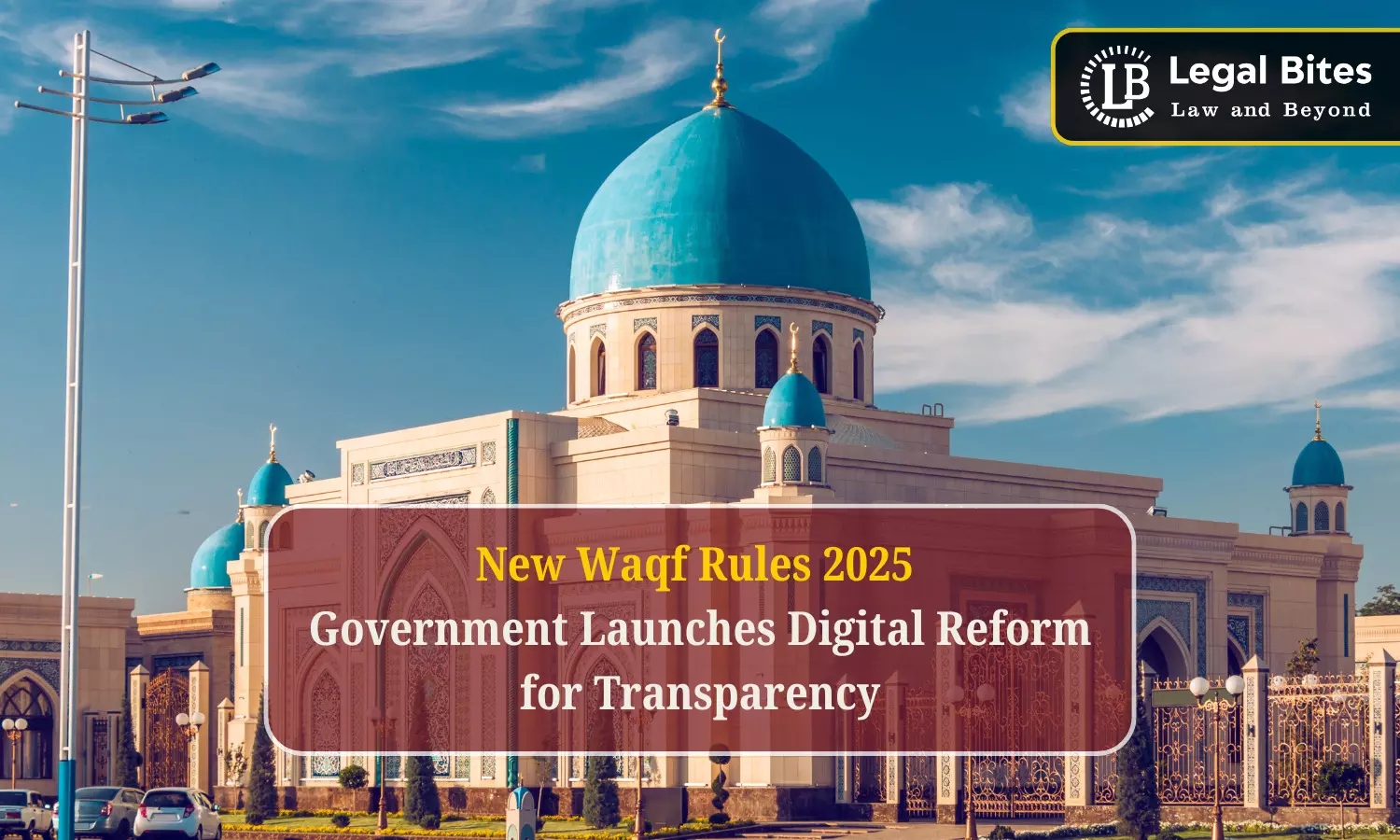
In a landmark regulatory reform, the Ministry of Minority Affairs has notified the Unified Waqf Management, Empowerment, Efficiency and Development Rules, 2025, aiming to bring digital transformation, transparency, and systemic efficiency to the management of Waqf properties across India.
These rules have been framed under the authority of Section 108B of the Unified Waqf Management Act, 1995, and signal a decisive step toward the digitisation of India’s vast Waqf asset base, which includes thousands of religious and charitable properties such as mosques, graveyards, schools, and community buildings.
Key Provisions and Framework of the 2025 Waqf Rules
1. Centralised Digital Portal and Database
A comprehensive Waqf Portal and Database will be established for:
- Filing details of existing Waqfs under Section 3B;
- Uploading lists of Waqf properties under Section 5;
- Online registration of new Waqfs under Section 36;
- Maintaining the Waqf register under Section 37;
- Submitting and maintaining financial accounts under Section 46;
- Publishing audit reports under Section 47; and
- Publicising Board orders and proceedings under Section 48.
The digital system will assign a unique identification number (UID) to each Waqf and each property dedicated to Waqf. This UID will be mandatory for all future references, aiding property tracking and preventing duplication across all states.
2. Roles and Responsibilities
The Joint Secretary of the Waqf Division, Ministry of Minority Affairs, has been appointed as the nodal supervisory authority for the portal and database. Further, each State Government is required to:
- Appoint a Nodal Officer not below the rank of Joint Secretary.
- Establish a Centralised Support Unit to assist in the uploading of Waqf property data, registration, audit, and account maintenance.
3. Mutawalli (Caretaker) Enrolment and Duties
Every mutawalli must:
- Enrol themselves on the portal using an OTP-based authentication process linked to mobile and email.
- Log in separately for each Waqf they administer.
Enter complete property details including:
- Boundaries, usage, encroachments (if any);
- Name and contact details of the Waqf creator (Waqif);
- Annual income, tax liabilities, and revenue estimates;
- Details of any ongoing court cases or legal claims.
Verification of uploaded details will be done by the CEO or another authorised officer of the Waqf Board within six days, and certified following the Second Schedule.
4. Accessibility and Inclusivity
The portal has been designed to be inclusive for persons with disabilities, allowing ease of navigation, readability, and data input in accordance with accessibility standards.
5. Real-Time Monitoring and Oversight
The rules mandate:
- Monitoring of duplication in property entries;
- Audit trails and activity logs for each function;
- A grievance redressal system overseen by the Joint Secretary;
- An annual performance review of the portal by an independent agency, which must submit its findings within 3 months. The Central Government will publish the findings and an “Action Taken Report” within another 3 months.
6. Use of Waqf Income for Social Welfare
In a progressive provision under Rule 8, where Waqf-alal-aulad (family Waqf) has no legal heir, its income may be used for:
- Welfare and maintenance of widows, divorced women, and orphans.
- Applications for such assistance must be submitted in Form 1. The Board will verify the claims and transfer amounts directly to the beneficiary’s bank account through electronic fund transfer.
7. Enhanced Audit and Financial Reporting Norms
- Every mutawalli must maintain books of account electronically (in Form 6).
- Annual income-expenditure details must be filed by October 1st each year.
- Even small Waqfs (income less than ₹1 lakh) must submit a simplified financial report.
- All audit reports will be published on the portal under Rule 13.
8. Uploading of Auqaf Lists by State Governments
Post-survey, each State Government is required to:
- Publish a complete list of Auqaf, including boundaries, usage, encroachers, and names of mutawallis.
- Upload this data within 90 days of Gazette publication.
- If delayed, reasons must be recorded and uploaded within another 90-day extension.
9. Registration of New Waqfs
Any Waqf created after the commencement of the 2025 Amendment must:
- Apply for registration within 3 months using Form 4.
Provide complete data such as:
- Waqf deed;
- Photographs of properties;
- Encumbrances and encroachments;
- Legal ownership details;
- Survey maps and coordinates;
- Certification that property is not government land, a protected monument, or falling under Schedule V or VI of the Constitution.
10. Comprehensive Registers of Auqaf
Under Rule 11, every Waqf Board must maintain a digital register (Form 5) detailing:
- UID numbers of Waqf and properties;
- Ownership deeds and property documents;
- Court cases, encroachments, and revenue information;
- Photographs and videos of properties;
- Income sources and expense allocations;
- Details of beneficiaries in Waqf-alal-aulad.
Budget Cap for Annual Estimates
Under Rule 15, the maximum budget limit for preparing consolidated annual estimates by the Waqf Boards is capped at ₹1 crore.
Why These Rules Matter
The Waqf sector in India, comprising more than 6 lakh properties, has long been plagued by issues of encroachment, mismanagement, lack of transparency, and poor recordkeeping. With the 2025 Rules, the Government aims to:
- Standardise Waqf governance across states;
- Enable accountability and reduce corruption;
- Leverage technology to promote efficient resource utilisation;
- Safeguard religious and charitable intent behind waqf endowments.
A Step Toward Reform and Accountability
The Unified Waqf Management Rules, 2025 herald a new era of digital accountability and public transparency for one of India’s most valuable and sensitive categories of religious endowments. By empowering mutawallis, modernising administrative oversight, and ensuring public access to vital information, the Government has taken a strong step toward responsible and equitable management of waqf resources.